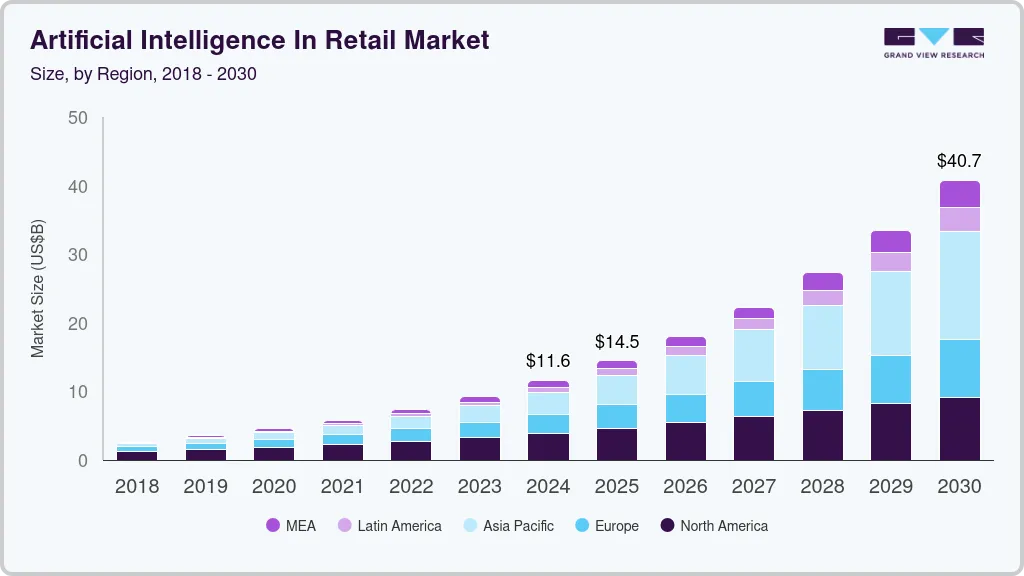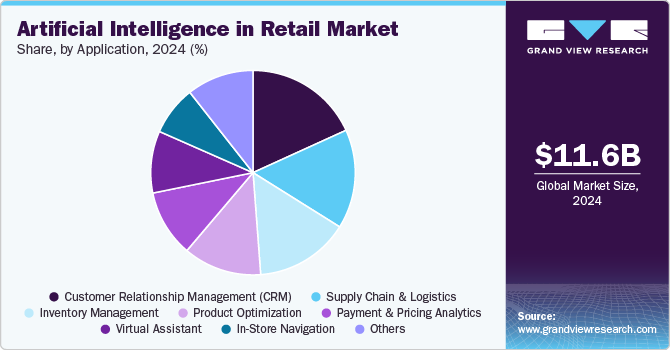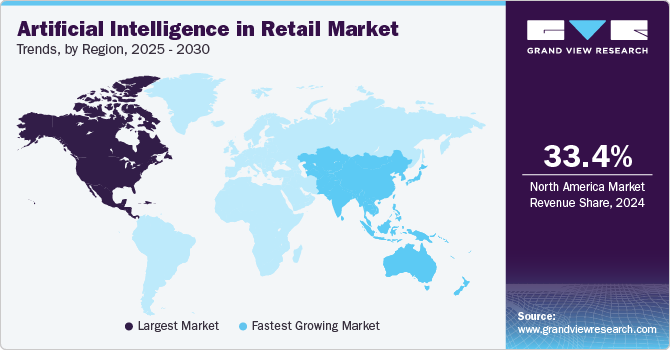- Home
- »
- Next Generation Technologies
- »
-
Artificial Intelligence In Retail Market Size, Share Report 2030GVR Report cover
![Artificial Intelligence In Retail Market Size, Share & Trends Report]()
Artificial Intelligence In Retail Market (2025 - 2030) Size, Share & Trends Analysis Report By Component (Solution, Services), By Technology (Machine Learning, Natural Language Processing), By Sales Channel, By Application, By Region, And Segment Forecasts
- Report ID: GVR-4-68039-975-1
- Number of Report Pages: 145
- Format: PDF
- Historical Range: 2018 - 2023
- Forecast Period: 2025 - 2030
- Industry: Technology
- Report Summary
- Table of Contents
- Interactive Charts
- Methodology
- Download FREE Sample
-
Download Sample Report
Artificial Intelligence In Retail Market Summary
The global artificial intelligence in retail market size was estimated at USD 11.61 billion in 2024 and is projected to reach USD 40.74 billion by 2030, growing at a CAGR of 23.0% from 2025 to 2030. The development of artificial intelligence in the retail market is fueled by factors like constantly rising internet users and smart devices, the need for surveillance and monitoring at a physical store, and government policies toward digitization.
Key Market Trends & Insights
- North America artificial intelligence in retail market dominated the global industry with a revenue share of 33.4% in 2024.
- The artificial intelligence in retail market in the U.S. held a dominant position in 2024.
- By component, the solution segment dominated the market with a revenue share of more than 62% in 2024.
- By technology, the machine learning segment led the market with the largest revenue share in 2024.
- By sales channel, the omnichannel segment dominated the market with a significant revenue share in 2024.
Market Size & Forecast
- 2024 Market Size: USD 11.61 Billion
- 2030 Projected Market Size: USD 40.74 Billion
- CAGR (2025-2030): 23.0%
- North America: Largest market in 2024
- Asia Pacific: Fastest growing market
Artificial intelligence in the retail industry revolves around how corporations have operated over the past few decades. Big data & analytics and AI are crucial to digital business; it has the capabilities to transform everything from customer experience to business operations. The adoption and awareness of big data analytics and artificial intelligence in retail have been growing due to technological advancements, increasing penetration of applications and smart devices, adoption of Machine Learning services, and proliferation of IoT. For instance, in February 2020, Baker Hughes, a provider of oil field services, partnered with C3.ai and announced the release of an AI-based application, BH3 production optimization, that enables operators to observe real-time production statistics and optimize operations, and better forecast future production, for increased gas and oil production rates.
Artificial intelligence in retail is fueling faster corporate decisions in product management, marketing, e-commerce, and other business domains by reducing the gap from insights to implementation. For instance, in June 2021, Talkdesk, Inc. introduced artificial intelligence based Talkdesk Retail Smart Service that delivers automated self-services to the consumer and support agents for concentrating on other major income generation tasks. These services serve personalized recommendations and better engagement to aid consumers.
Moreover, Artificial intelligence-based chatbot assistance is gaining popularity across the retail industry owing to its highly efficient consumer service. This chatbot provides personalized and dedicated responses to customers, boosting consumer satisfaction.
Technological advancement in the retail industry, such as computer vision, is gaining traction at brick-and-mortar outlets. Computer vision is a distinctive type of AI deep learning in retail that interprets and “sees” visual data. This advancement opens the opportunity for new retail across inventory management, demand forecasting, customer experience, and more. For instance, in June 2022, Intel Corporation, ASUSTeK Computer Inc., and Microsoft Corporation collaborated to release AI DevKit, the world's first AI on PC Development Kit. The AI on the PC Development Kit is developed with deep neural networks and computer vision applications for the PC. Integration of Solution and hardware, with tutorials and source code that aids in the creation of compelling AI applications and enables new applications.
Component Insights
The solution segment dominated the market with a revenue share of more than 62% in 2024. The emerging challenges in managing several retail operations are said to boost the retail sector's innovative and new automated technologies. AI-powered technologies aid retailers in managing warehouse management, supply chain operations, logistics, and improving consumer experience. The emergence of solutions, such as IBM Watson, Salesforce Einstein, Google Machine Learning AI Platform, and Content DNA Platform, has propelled Artificial Intelligence in retail market share.
Services are likely to record immense growth throughout the forecast period. Artificial intelligence in retail could exhibit profound growth on the back of robust demand for managed services to boost efficiency, higher productivity, and accuracy to optimize business operations. Hence, the speedy adoption of AI solutions is growing the demand for services as it helps create smart functions, enhances the consumer experience, improves revenue growth potential, enables rapid innovation, and reduces human error.
Technology Insights
The machine learning segment led the market with the largest revenue share in 2024. Machine learning serves fast and is suitable for delivering personalized experiences to consumers. To fuel efficiency, it aids retail vendors in enhancing supply chain systems and demand forecasts. For example, Amazon Inc. Amazon SageMaker is a wholly organized service that utilizes machine learning techniques for applications, from anticipating analytics to consumer experience.
Furthermore, NLP is also predicted to achieve rapid growth throughout the forecast period. An exponential rise in data analysis and the trend for AI-driven chatbots will boost advancements in NLP. NLP-powered chatbots, including mobile interfaces and touchscreen, will help foster interactive customer experience. Besides, NLP can help in sentiment analysis to assess call center interactions, customer messages, social media posts, and online reviews.
The image and video analytics segment is expected to exhibit significant growth during the forecast period. The trend for retail video analytics comes back to the surging popularity of business intelligence tools to gain input on in-store promotional strategies and queue data and bolster the security of malls and chain shops. Furthermore, AI video analytics enables retailers to gather valuable data on customer demographics, behaviors, and preferences. By analyzing foot traffic patterns and dwell times, retailers can gain insights into how customers navigate stores, which products attract attention, and where bottlenecks occur. This information allows for tailored marketing strategies and personalized shopping experiences, enhancing customer satisfaction and loyalty.
Sales Channel Insights
The omnichannel segment dominated the market with a significant revenue share in 2024. Omnichannel strategies have gained immense popularity due to the expansion of digitization across developing and developed countries. Moreover, headless commerce has set the trend to leverage retailers to provide payment gateways and products across kiosk screens, progressive web apps, smartwatches, and mobile apps. Omni channel experience will gain prominence in light of the digitized supply chain and focus on providing a seamless customer experience.
Pure-play online retailers are predicted to achieve hastened progress due to the rising online & virtual shopping. The proliferation of IoT, AI, and social media will augur global market growth. Many retail vendors are enhancing their online customer-service competencies by adopting artificial intelligence solutions.
Application Insights
The Customer Relationship Management (CRM) segment dominated the market in 2024. The CRM segment will gain prominence with strong demand to boost customer retention and customer service. AI-powered search engines, virtual assistance, chatbots, and other solutions aid retail vendors in building loyalty and strong customer relationships. Moreover, applications of CRM could help boost social media integration, seamless communication, and data collection for retail businesses.
The virtual assistance segment is anticipated to witness the fastest CAGR growth from 2025 to 2030 on the heels of the high penetration of smartphones and other advanced tools. The retail sector has explored opportunities in virtual assistant technologies to streamline the supply chain, including invoicing, ordering inventory, and bookkeeping.

The supply chain and logistics segment holds a significant share of the market. Major companies are employing this application in their business process to make it smooth and efficient. For instance, in September 2020, Symphony RetailAI, a company based in the U.S. and a global provider of artificial intelligence marketing, supply chain, and merchandising solutions for FMCG manufacturers and retailers, announced an agreement with Netto and Intermarche. Symphony RetailAI's AI-based devices would facilitate a 360-degree complete overview of this data, allowing for much more efficient use and greater agility in all aspects of the supply chain.
Regional Insights
North America artificial intelligence in retail market dominated the global industry with a revenue share of 33.4% in 2024. The opportunities for industry expansion as significant investments are being made in AI projects and related research and development activities. Furthermore, regional retail vendors are concentrating on extracting available data on customer preferences to improve customer service efficiency. Moreover, leading companies, such as Google Inc., Microsoft, IBM Corporation, Salesforce, and Amazon Web Services, adopt organic and inorganic strategies. For instance, in January 2021, Google Machine Learning rolled out Product Discovery Solutions for retail to foster personalized online shopping.

U.S. Artificial Intelligence In Retail Market Trends
The artificial intelligence in retail market in the U.S. held a dominant position in 2024, retailers are increasingly leveraging AI to deliver personalized shopping experiences. By analyzing customer data, AI tools can recommend products tailored to individual preferences, boosting customer engagement and loyalty. Moreover, AI is enhancing inventory management through predictive analytics. Retailers can forecast demand more accurately, reducing excess stock and minimizing out-of-stock situations, leading to improved operational efficiency.
Europe Artificial Intelligence In Retail Market Trends
The artificial intelligence in retail market in Europe is driven by the increasing adoption of AI technologies such as machine learning, computer vision, and natural language processing, which are revolutionizing how retailers engage with customers and manage operations. Retailers are leveraging AI for applications like personalized product recommendations, demand forecasting, and inventory management, enhancing customer experiences while optimizing supply chains.
Asia Pacific Artificial Intelligence In Retail Market Trends
The artificial intelligence in retail market in Asia Pacific is anticipated to grow at a significant CAGR from 2025 to 2030. This surge is fueled by the widespread adoption of AI technologies such as machine learning, computer vision, and natural language processing, which are being utilized to enhance customer experience through personalized shopping and efficient inventory management. Retailers are increasingly leveraging AI for applications like predictive analytics, which helps optimize supply chains and improve demand forecasting.
Key Artificial Intelligence In Retail Company Insights
The market is characterized by intense competition, with a few major global players holding a significant market share. Key players emphasize new product developments to offer avenues for increased profitability through better customer relationships.
-
NVIDIA Corporation is a leading technology company renowned for its contributions to graphics processing units (GPUs) and artificial intelligence solutions. In the retail sector, NVIDIA leverages its AI capabilities to transform customer experience and optimize operations. The company’s AI platform empowers retailers to create intelligent stores that enhance customer engagement and streamline processes.
-
Microsoft Corporation is known for its software products, cloud services, and innovative solutions. In the retail sector, Microsoft is leveraging its AI technologies to enhance customer experience, streamline operations, and drive business growth. The company's Cloud for Retail platform integrates AI-driven tools and data analytics to help retailers navigate the complexities of modern shopping behaviors and operational challenges.
Key Artificial Intelligence In Retail Companies:
The following are the leading companies in the artificial intelligence in retail market. These companies collectively hold the largest market share and dictate industry trends.
- NVIDIA Corporation
- Microsoft Corporation
- Google LLC
- IBM Corporation
- SAP SE
- Oracle Corporation
- Sentient technologies
- Intel Corporation
- Salesforce, Inc.
Recent Developments
-
In October 2024, NVIDIA and Accenture started an extended partnership, which includes the establishment of a new NVIDIA Business Group by Accenture aimed at helping global enterprises accelerate their AI adoption. The new group will assist clients in building the foundation for agentic AI capabilities through Accenture’s AI Refinery, utilizing the complete NVIDIA AI stack-comprising NVIDIA AI Enterprise, NVIDIA AI Foundry, and NVIDIA Omniverse-to enhance areas like process transformation, AI-driven simulation, and sovereign AI.
-
In October 2024, Microsoft Corp. and Rezolve AI, a leader in AI-driven commerce solutions, have announced a strategic partnership aimed at equipping retailers with enhanced digital engagement capabilities. This collaboration will see Rezolve AI's Brain Suite-comprising Brain Commerce, Brain Checkout, and Brain Assistant-powered by Microsoft Azure and made available worldwide through Microsoft’s Azure Marketplace and co-sell channels.
Artificial Intelligence In Retail Market Report Scope
Report Attribute
Details
Market size value in 2025
USD 14.49 billion
Revenue forecast in 2030
USD 40.74 billion
Growth rate
CAGR of 23.0% from 2025 to 2030
Base year for estimation
2024
Historical data
2018 - 2023
Forecast period
2025 - 2030
Quantitative units
Revenue in USD million/billion and CAGR from 2022 to 2030
Report coverage
Revenue forecast, company ranking, competitive landscape, growth factors, and trends
Segments covered
Component, technology, sales channel, application, region.
Regional scope
North America, Europe, Asia Pacific, South America, MEA
Country scope
U.S., Canada, Mexico, UK, Germany, France, China, India, Japan, Brazil.
Key companies profiled
NVIDIA Corporation, Microsoft Corporation, Google LLC, IBM Corporation, SAP SE, Oracle Corporation, Sentient technologies, Intel Corporation, Salesforce, Inc.
Customization scope
Free report customization (equivalent up to 8 analysts working days) with purchase. Addition or alteration to country, regional, and segment scope.
Global Artificial Intelligence In Retail Market Report Segmentation
This report forecasts revenue growth at global, regional, and country levels and provides an analysis of the latest industry trends in each of the sub-segments from 2018 to 2030. For this study, Grand View Research has segmented the global artificial intelligence in retail market reports based on components, technology, sales channel, application, and region:
-
Component Outlook (Revenue, USD Million; 2018 - 2030)
-
Solution
-
Service
-
-
Technology Outlook (Revenue, USD Million; 2018 - 2030)
-
Machine Learning
-
Natural Language Processing
-
Chatbots
-
Image and Video Analytics
-
Swarm Intelligence
-
-
Sales Channel Outlook (Revenue, USD Million; 2018 - 2030)
-
Omnichannel
-
Brick and Mortar
-
Pure-play Online Retailers
-
-
Application Outlook (Revenue, USD Million; 2018 - 2030)
-
Customer Relationship Management (CRM)
-
Supply Chain and Logistics
-
Inventory Management
-
Product Optimization
-
In-Store Navigation
-
Payment and Pricing Analytics
-
Virtual Assistant
-
Others
-
-
Regional Outlook (Revenue, USD Million; 2018 - 2030)
-
North America
-
U.S.
-
Canada
-
Mexico
-
-
Europe
-
Germany
-
UK
-
France
-
-
Asia Pacific
-
China
-
India
-
Japan
-
-
South America
-
Brazil
-
-
Middle East & Africa
-
Frequently Asked Questions About This Report
b. The global artificial intelligence in retail market size was estimated at USD 11.61 billion in 2024 and is expected to reach USD 14.49 billion in 2025.
b. The global artificial intelligence in retail market is expected to grow at a compound annual growth rate of 23.0% from 2025 to 2030 to reach USD 40.74 billion by 2030.
b. North America dominated the AI in the retail market with a share of 33.4% in 2024. The opportunities for industry expansion as significant investments are being made in AI projects and related research and development activities.
b. Some key players operating in the AI in retail market include NVIDIA Corporation, Microsoft Corporation, Google LLC, IBM Corporation, SAP SE, Oracle Corporation, Sentient technologies, Intel Corporation, Salesforce, Inc.
b. Key factors that are driving the market growth include growing awareness and application of AI in the retail industry, increasing necessity for superior surveillance
Share this report with your colleague or friend.
Need a Tailored Report?
Customize this report to your needs — add regions, segments, or data points, with 20% free customization.

ISO 9001:2015 & 27001:2022 Certified
We are GDPR and CCPA compliant! Your transaction & personal information is safe and secure. For more details, please read our privacy policy.
Trusted market insights - try a free sample
See how our reports are structured and why industry leaders rely on Grand View Research. Get a free sample or ask us to tailor this report to your needs.










